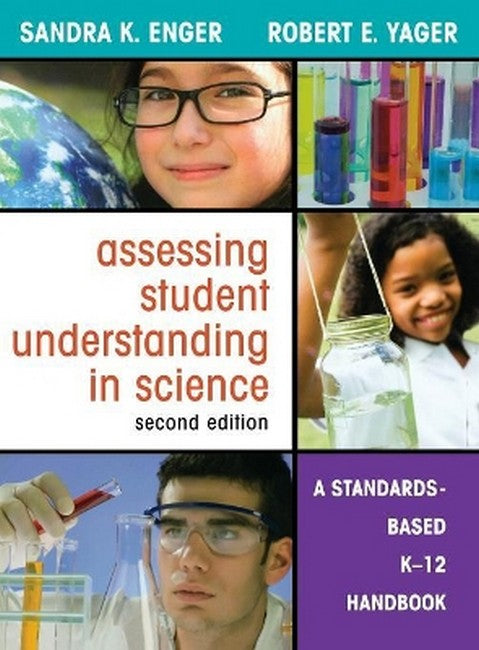Sandra K. Enger is a faculty member at The University of Alabama in Huntsville (UAH) and associate director of the Institute for Science Education. She teaches methods courses for preservice teachers in elementary science and also undergraduate and graduate assessment courses. As a professional development provider, she has worked with international teachers from Russia, the Ukraine, and multiple Trans-Eurasian countries. Her consulting work includes development of assessment materials, conducting project evaluations, and participation in alignment studies. She graduated from Winona State (MN) University with a BS in science and a master's degree in biological sciences. Her PhD in science education was awarded by The University of Iowa. She has had extensive classroom experience at both secondary and university levels. Robert E. Yager is professor emeritus of science education at The University of Iowa, where he also earned two graduate degrees. He has di-rected over 100 National Science Foundation projects and has served as chair for nearly 130 doctoral students. Yager has served as president for seven national professional organizations. He has been involved internationally with special ongoing projects in Korea, Taiwan, Japan, Turkey, and Estonia. Yager's research interests and teaching are involved with science, technology, and society (STS), es-pecially in terms of it as an instructional reform effort and the other visions outlined in the National Science Education Standards. He continues to identify Exemplary Science Programs across the world.
Request Academic Copy
Please copy the ISBN for submitting review copy form
Description
Preface Acknowledgments About the Authors 1. A Framework for Assessing Student Understanding in Science Assessment Based on Six Domains of Science I. Conceptual Domain II. Process Domain III. Application Domain IV. Attitude Domain V. Creativity Domain VI. Nature of Science Domain Assessment Approaches Aligned With the Six Domains 2. Assessment in the Contexts of Teaching Planning Instruction and Assessment What Assessment Is Formative and Summative Assessment Assessment Types and Approaches National Science Education Assessment Standards Implementing Assessment Guidelines The Internet as an Assessment Resource 3. Evaluating Teaching Practice Action Research Assessment of Classroom Practice With Video Recording Support Sources of Instrumentation for Assessing Practice Self-Assessment of Constructivist Practice Science-as-Inquiry Surveys 4. Rubrics and Scoring Guides Rubrics and Scoring Guides: What Are They? Rubric Construction: A Teacher's Perspective Rubric or Scoring Guide Design Examples of Tasks and Rubrics How Well Does a Rubric Communicate the Original Task? 5. Science Notebooks Science Notebooks: Formative and Summative Assessment Tools Notebook Scaffolds Assessment Components for Notebooks Supporting Graphing Skills and Abilities 6. Assessment Examples for All Grade Levels Open-Ended Questions (Integrates Domains) Student Laboratory Environment Inventory (Integrates Domains) Ideas for Assessing in the Application Domain Observation Checklist (Integrates Domains) Use of Application-Level Multiple-Choice Questions Examples for the Creativity Domain Assessing Attitudes, Preferences, and Processes 7. Assessment Examples for Grades K Through 4 Applying Process Skills and Experimental Design Application Assessment Items for Grades K Through 3 Assessing Attitudes About Science Student Self-Assessment Assessing Perceptions About Scientists 8. Assessment Examples for Grades 5 Through 8 Developing a Group Performance Task Preparation for Standardized Tests Electronic Portfolios for Students Structuring Peer Assessment for Cooperative Groups Class Assessment of Group Project Presentations 9. Assessment Examples for Grades 9 Through 12 Using the Student Laboratory Environment Inventory Looking at Science Processes Assessing Specific Areas of Understanding Assessing Students' Views of the Scientific Process Glossary of Assessment-Related Terminology References Index
"In this second edition, Enger and Yager expand their previous work by suggesting new assessments and more clearly connecting their assessments with the National Science Education Standards. For classroom teachers, this book offers a range of suggestions that can enhance classroom instruction. For science teacher educators, this book is an invaluable and handy resource in working with beginning, new, or experienced science teachers." -- Julie A. Luft, Professor of Science Education "This valuable contribution to the field offers clear explanations and examples of different types of assessments and suggests very practical applications for teachers of all levels. The authors present some wonderfully creative approaches to assessment, going beyond the usual methods." -- Petrina McCarthy, Science Teacher "The material enables readers to self-assess on many levels: their own understanding of assessment in general, how assessment looks within the science content, and the many different applications. The coverage appeals to science teachers at all levels and all disciplines." -- Rachel Hull, Fourth-Grade Teacher "Does an exceptional job of addressing the most controversial and misunderstood aspect of delivering quality science instruction. The six domains of quality science teaching are addressed with examples of what is included in each. The book clearly describes various types of assessments, with the advantages and disadvantages of each. It also provides numerous references on asessing students in science." -- Fred D. Johnson, Retired Superintendent "Drawing on the latest research, best practices, and the wisdom of practitioners from all levels of the education spectrum, this powerful, comprehensive document pinpoints and prioritizes our work to ensure a foundation for all classroom applications of assessments. This is an invaluable resource for educators, K-12." -- Jack Rhoton, Executive Director, Center of Excellence in Mathematics and Science Education "This text offers information regarding the theory and real-world applications of a variety of assessments that can be used to address the unique standards of science education. The text addresses the need to assess all six domains of science literacy and offers tried-and-true methods and instruments that can be used to assess each domain. It does so by providing definitions of each domain and offering specific suggestions as to how the results can be used across the range of levels in our schools. The text is a wonderful collection of science-specific assessment information that can be used by those of us interested in assessing students and conducting research in K-12 science education." -- David A. Wiley, Dean, College of Education and Human Services

